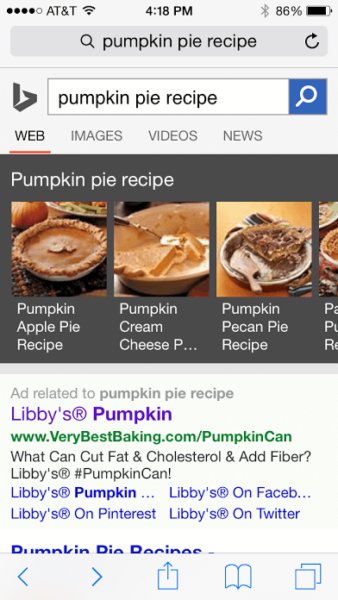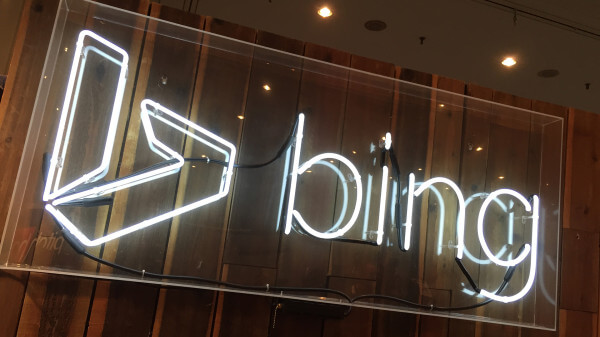A conversation with Emma Williams, Bing’s lead designer and Executive General Manager.
 Six months ago, Bing General Manager Emma Williams was sitting on the sofa with her mom, trying to find a Cary Grant movie, but neither could recall the name of the film they wanted to watch.
Six months ago, Bing General Manager Emma Williams was sitting on the sofa with her mom, trying to find a Cary Grant movie, but neither could recall the name of the film they wanted to watch.
“I started searching on my Tivo for Cary Grant. I went through my XBox, I spent 45-minutes trying to nail down the movie – which happened to be Arsenic and Old Lace,” says Williams, “We wasted 45-minutes of our togetherness time searching.”
After being unable to find the one Cary Grant movie they couldn’t name, Williams returned to work determined to create a new experience around Bing movie searches. Tasked with building a deep emotional connection between Bing and its users across all devices and products, Williams leads the Bing Studio in her role as General Manager.
“We have one billion entities; we know about people, places and things, so we darn well know about Cary Grant and his movies,” said Williams. She told her staff that she wanted to invent an experience where should could find Cary Grant’s Arsenic and Old Lace in four seconds.
And that’s just what they did.
Now when you search ‘Cary Grant movies’ on Bing, you’ll see a carousel of the actor’s films. “Arsenic and Old Lace is there,” says Williams, “You click on it, and even better, it tells you exactly which app provider you can find it on and where you can watch it.”
 As Bing’s General Manager, Williams oversees the design of Bing product and device experiences across desktop and mobile, including Cortana and the Windows 10 smart search experience, along with Bing’s daily homepage design.
As Bing’s General Manager, Williams oversees the design of Bing product and device experiences across desktop and mobile, including Cortana and the Windows 10 smart search experience, along with Bing’s daily homepage design.
“We think very deeply about emotional resonance,” says Williams.
Raised in Ireland, Williams earned her degree in Anglo-Saxon English, eventually learning thirteen different languages. It was her love of language that led her to Unix scripting.
“I fell in love with Unix scripting,” says Williams after she realized it was simply another language. Twenty-three years into her software career, Williams landed at Microsoft.
When asked to define her design philosophy, Williams quickly refers to her love of Medieval art and the use of perspective by the Italian art masters.
“If you start looking at some of the paintings by Botticelli, Tintoretto, Titian, Da Vinci, of course, and even the Dutch masters, the thing that they do very cleverly is they use perspective in their paintings to aid in storytelling and also to aid in where they want the eye to focus first.”
Williams says the very first thing she tells her team when they begin to think about UI development and design is to focus on where they want the human eye to go first.
“If you look at what we’ve done over the last year from a design perspective,” says Williams, “It’s been about improving where the eye focuses across the canvas, particularly on mobile.”
According to Williams, a lot of her time has been spent thinking about how women use search.
“Being a woman, I’ve always had a very strong fascination for how we design things that really appeal to women as much as men.”
After doing deep research into how women interact with search, Bing found women tend to be more “gatherers” versus “hunters” when searching, and are more visual and socially interactive. Williams says her team’s research found search queries by females were often on mobile and centered very highly on recipes, commerce, and health queries.
“I looked at our recipes experience on desktop and mobile, and felt, based on this research, we should do a much better job for women,” said Williams, “On a small mobile device, it has to be glance-able, and it has to be immersive. There has to be great visuals.”
 Williams says Bing has taken what it learned during the past year, and applied it to create more visually rich search experiences across the board.
Williams says Bing has taken what it learned during the past year, and applied it to create more visually rich search experiences across the board.
“We actually applied it to some of the more obviously male-dominated areas as well,” says Williams, “Nascar is one we’re just launching now.”
 Looking toward the future, Williams says mobile will ultimately become a background device, that the Internet of Things will be what is most important.
Looking toward the future, Williams says mobile will ultimately become a background device, that the Internet of Things will be what is most important.
“I think of the world of search and the world of intelligent agents really coming together very strongly. I also see the Internet of things and the computing being incredibly important – but it means we have to crack though and make mobile really work for humans in the world today.”
She says often people forget touch and voice input are just as important – if not more important – on a mobile device.
“In the future we need to make sure voice input feels effortless,” says Williams. While the goal of mobile right now should be glance-ability and visually rich experiences, Williams predicts the future of UI is no UI at all.
“The world of computing needs to become as infused with emotional intelligence as it is with intellectual intelligence.”




